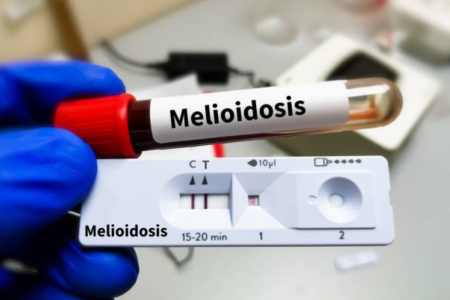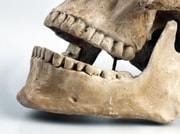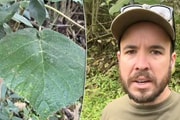Silent killer strikes: Deadly bacterial outbreak claims two lives, infects 28
By
Gian T
- Replies 9
A growing threat has emerged in the wake of heavy rains, disrupting the tranquillity of the region and silently affecting lives.
Health authorities are monitoring the situation closely as more cases continue to surface.
With the full extent of its impact still unfolding, concerns are growing over what may come next.
Melioidosis, caused by the bacterium Burkholderia pseudomallei, is a severe infection that can be life-threatening.
It's a disease that thrives in tropical climates such as Far North Queensland and is contracted through direct contact with contaminated soil, air, or water.
'We think it's just because there's a lot of bacteria in the soil in those areas,' Tropical Public Health Services director Jacqui Murdoch noted.
The bacteria can enter the body through cuts and wounds, inhalation, or drinking contaminated water, making it a particularly insidious foe.
The Cairns and Hinterland Hospital and Health Service has reported a startling increase in melioidosis cases since November, with 36 individuals affected.
This is a significant jump from the 14 cases recorded during the same period last year, which was already considered a high number.
The recent spike in cases has health authorities on high alert, urging the public to be vigilant and to seek medical attention if they experience symptoms resembling the flu, such as fever, cough, or difficulty breathing.
However, melioidosis does not discriminate and can affect even the young and healthy.
This makes it crucial for everyone in the region to be aware of the risks and to take preventative measures.
Dr Jacqui Murdoch, the director of Tropical Public Health Services, has emphasised the importance of early detection and treatment.
'You might not know [it's melioidosis]. That's why it's really important to go and see a GP or go to the emergency department early if you get a fever, cough or difficulty breathing,' he said.
She notes that most of the recent cases have been contracted through airborne particles, particularly affecting those with pre-existing lung conditions.
The flooding in Townsville has exacerbated the situation, leading to a spike in cases, with 11 reported since the start of the year.
To protect yourself and your loved ones, it's recommended to avoid outdoor work during rainfall, wear protective masks when using high-pressure hoses around mud or soil, and cover any skin abrasions.
Regular check-ups with healthcare providers are also essential, especially for those with underlying health conditions.
The rise in melioidosis cases is a stark reminder of the hidden dangers that can emerge in the wake of extreme weather events.
As our climate changes, we'll likely see more such outbreaks.
It's more important than ever to stay informed about potential environmental health risks and take proactive steps to safeguard our health.
Members of the Seniors Discount Club, particularly those residing in or visiting tropical areas, should be especially cautious during the wet season.
If you or someone you know is experiencing symptoms that could be related to melioidosis, don't hesitate to seek medical attention promptly.
Early intervention can be the key to a successful recovery.

Have you or someone you know been affected by melioidosis or similar environmental health concerns? Share your experiences and tips for staying healthy in the comments below. Your insights could help fellow members stay safe and informed.
Health authorities are monitoring the situation closely as more cases continue to surface.
With the full extent of its impact still unfolding, concerns are growing over what may come next.
Melioidosis, caused by the bacterium Burkholderia pseudomallei, is a severe infection that can be life-threatening.
It's a disease that thrives in tropical climates such as Far North Queensland and is contracted through direct contact with contaminated soil, air, or water.
'We think it's just because there's a lot of bacteria in the soil in those areas,' Tropical Public Health Services director Jacqui Murdoch noted.
The bacteria can enter the body through cuts and wounds, inhalation, or drinking contaminated water, making it a particularly insidious foe.
The Cairns and Hinterland Hospital and Health Service has reported a startling increase in melioidosis cases since November, with 36 individuals affected.
This is a significant jump from the 14 cases recorded during the same period last year, which was already considered a high number.
The recent spike in cases has health authorities on high alert, urging the public to be vigilant and to seek medical attention if they experience symptoms resembling the flu, such as fever, cough, or difficulty breathing.
The elderly and those with compromised immune systems, including individuals with diabetes, cancer, kidney, and lung problems, are at heightened risk.However, melioidosis does not discriminate and can affect even the young and healthy.
This makes it crucial for everyone in the region to be aware of the risks and to take preventative measures.
Dr Jacqui Murdoch, the director of Tropical Public Health Services, has emphasised the importance of early detection and treatment.
'You might not know [it's melioidosis]. That's why it's really important to go and see a GP or go to the emergency department early if you get a fever, cough or difficulty breathing,' he said.
She notes that most of the recent cases have been contracted through airborne particles, particularly affecting those with pre-existing lung conditions.
The flooding in Townsville has exacerbated the situation, leading to a spike in cases, with 11 reported since the start of the year.
To protect yourself and your loved ones, it's recommended to avoid outdoor work during rainfall, wear protective masks when using high-pressure hoses around mud or soil, and cover any skin abrasions.
Regular check-ups with healthcare providers are also essential, especially for those with underlying health conditions.
The rise in melioidosis cases is a stark reminder of the hidden dangers that can emerge in the wake of extreme weather events.
As our climate changes, we'll likely see more such outbreaks.
It's more important than ever to stay informed about potential environmental health risks and take proactive steps to safeguard our health.
Members of the Seniors Discount Club, particularly those residing in or visiting tropical areas, should be especially cautious during the wet season.
If you or someone you know is experiencing symptoms that could be related to melioidosis, don't hesitate to seek medical attention promptly.
Early intervention can be the key to a successful recovery.
Key Takeaways
- Heavy rains in Far North Queensland have been linked to a spike in cases of the bacterial disease melioidosis, including two fatalities.
- Health authorities are alerting the public to be vigilant and seek medical attention if they exhibit any flu-like symptoms indicative of melioidosis.
- There has been a significant increase in melioidosis cases in the Cairns and Hinterland region compared to the previous year, with most infections occurring in the southern corridor of Cairns.
- Precautions recommended include avoiding outdoor work during rain, wearing masks when using high-pressure hoses around soil, and covering skin abrasions to prevent infection, especially for those with pre-existing medical conditions like diabetes, cancer, and lung issues.








